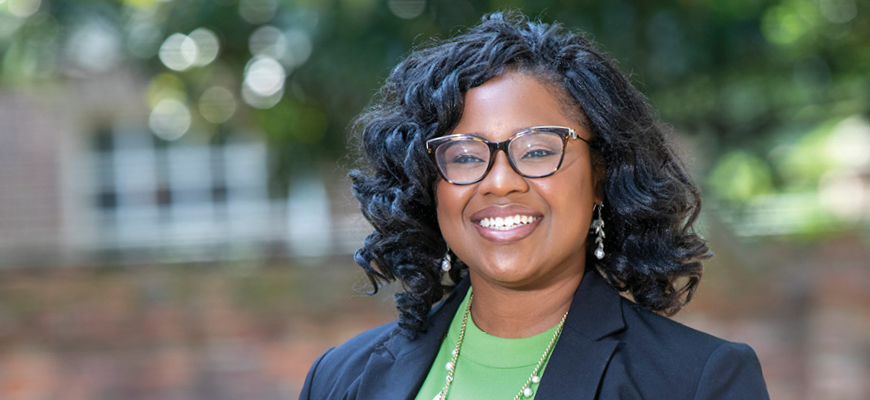
Mungo Undergraduate Teaching Award: Eliza Braden
Posted on: June 16, 2021; Updated on: June 16, 2021
By Craig Brandhorst, craigb1@mailbox.sc.edu , 803-777-3681
Eliza Braden
Associate professor, instruction and teacher education
Ph.D., Georgia State University, 2014
2021 Mungo Undergraduate Teaching Award
Joined UofSC faculty: 2015
Before I was a professor, I was an elementary school teacher for eight years. I taught emergent bilinguals students in our ESOL program and served as an early interventionist in reading. During this time, I gained a major appreaciation for bi/multilingual readers and writers. I am passionate about affirming the knowledge, expertise, and wisdom that culturally and linguisitically diverse learners bring to school. This is a central message in my teaching.
Children deserve good teachers, quality langauge arts teachers come with a disposition that their students are readers, they are writers, they are competent. Like others, I belive that children hold genius, they are geniuses. It is a teacher’s job to nurture this genius.
One thing that I do is have students think about critical incidents from their literate life that resonated with them. They create a literacy timeline — those incidents in their past that have shaped them as literate individuals — then I have them think about the incidents that happen in the lives of students who are African American, or who are Latino/Latina, or who are Asian American, and other groups that are not their own. Thinking about their own experiences and the experiences of others, they come to understand that while we may experience the world similarly, we may develop literacy in different ways. I want them to be prepared to lift these literacies in their classrooms. They have to understand that curriculum designed for children are often not designed with diverse populations in mind, if they are going to truly touch hearts and minds they have to be equipped to see the possibilities that every literacy act is bilingual and biliterate.
Students come into our classrooms as literate individuals in different ways. We want to honor those literacies that they enter our classrooms. This is where class intersects. If I’m coming into the classroom as a Black middle-class woman from the south, some of my cultural experiences may match some of the experiences of Black children but there will be times when our experienes differ. It goes beyond just race. It has to do with a lot of other social identities as well. Introspection of self is a key component of my teaching.
I enjoy my work because I spend a considerable amount of time in classrooms with teachers. Even during the pandemic, my students joined virtual classrooms weekly in our embedded methods course. Although we were unable to be on site at a school as we would traditionally meet, students were still able to see various models of teaching in action. It is important that they see what good teaching looks and sounds like even in a virtual environment.
When my students are observing a teacher, I’m always looking at how my own students respond, verbally but also physically to the teacher’s pedagogical and relational moves, particularly a teacher who regards him or herself as culturally responsive educator. I uses these responses in our debriefs.
Sometimes our discomfort in the moment means that we are on the edge of learning something new about pedagogy, or we’re on the edge of learning something new about social justice. When they experience that discomfort, I want them to understand that they are on the verge of learning something new, and that’s their purpose for being here at the university.
I see teaching as a journey. My passion for teaching is to always get my students to see that you never stop learning. It’s not like you finish your senior year and you’re done. No, honestly, you’re just starting. I don’t feel like I have all the answers, either. I’m still learning from people in my profession each and everyday.